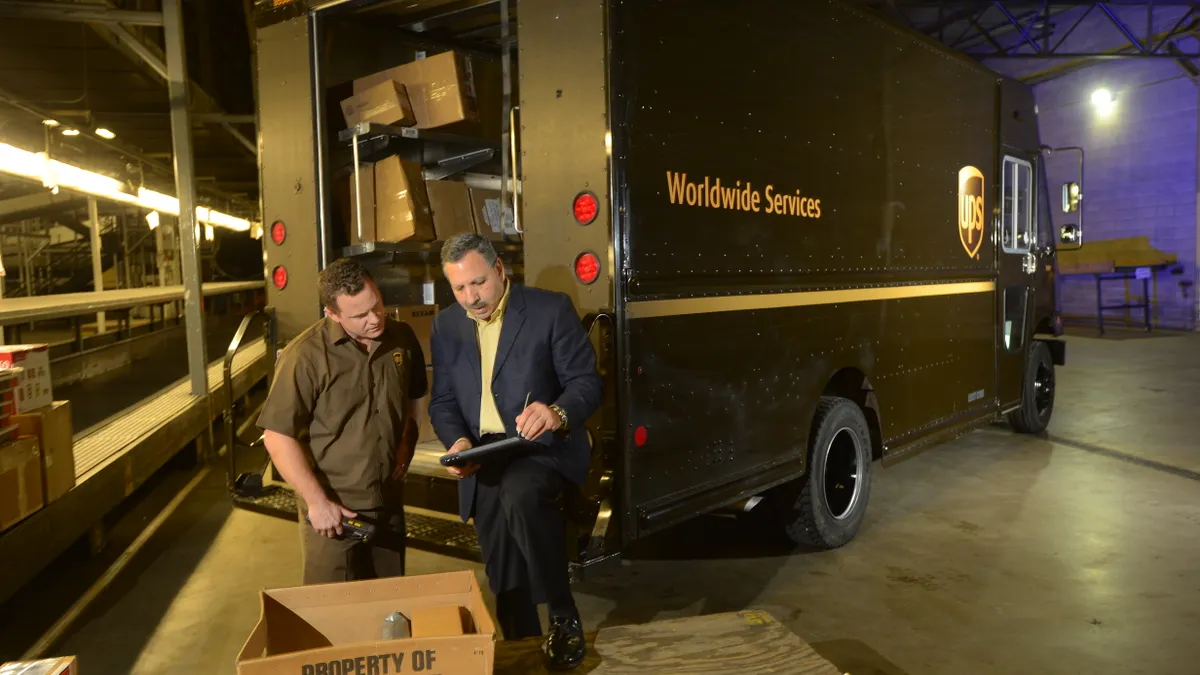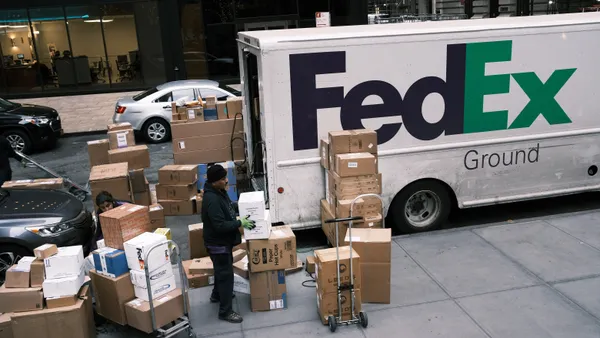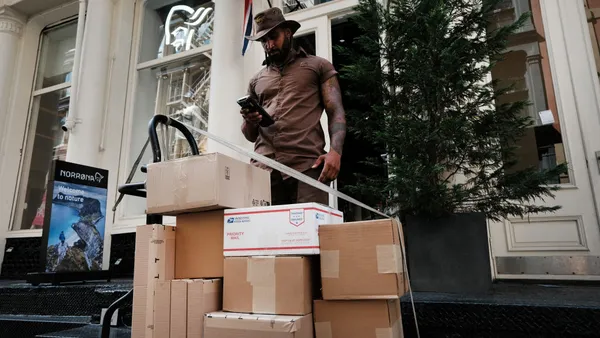Dive Brief:
- Carrier diversity will be key for shippers preparing for this year’s peak season, panelists said during a webinar Tuesday. "Every retailer should be focusing on diversifying their carriers. Shake up that carrier mix," said DHL eCommerce Solutions Regional Sales Manager Kim Gimble. "All of the carriers are not best at everything."
- Shippers should look to regional carriers to supplement their main, national carrier, David Sullivan, VP of professional services at Shipware, said on the webinar. Regional networks are, for the most part, built for business-to-consumer operations and have "much less onerous" pickup requirements, he said.
- Because of the coronavirus, flexibility is also important in fulfillment models. "What we're recommending to folks is, have a backup plan if you lose a facility," said David Glick, CTO at Flexe and former VP of fulfillment technology at Amazon. One case of COVID-19 could take a fulfillment center offline for a number of days, he said.
Dive Insight:
Rapid e-commerce adoption has been a "huge stress across the entire network, [for] fulfillment and shippers and carriers and customers," said Michael Miller, chief product and strategy officer at Convey. "Frankly, we think that these dynamics will be in place for the foreseeable future ... in other words, we think it's the new normal."
The pandemic introduced atypical market conditions and consumer-buying patterns, upping demand in e-commerce and increasing the need for business-to-consumer deliveries. In the U.S., e-commerce spending grew 93% in May year over year, according to a SpendingPulse report from Mastercard. That has resulted in peak-season-level demand for some companies.
"It's going to be Black Friday every day until it's Black Friday — and then it's going to be Black Friday times-two," Glick said.
For DHL, peak "is not ending any time soon," Gimble said. The rush put a strain on DHL's capacity, and it needed to deploy several hiring campaigns. DHL Express is hiring for 400 new full- and part-time jobs to handle U.S. parcel volume. Over the past few weeks, retailers have been running into issues with carriers capping volume, Gimble said.
"Not having enough capacity is a major issue these days. Today, online companies are recognizing that having multiple carriers is an easy ... resolution for the capped volume. You could just switch it over to another carrier," Gimble said.
Forecasting volume can also help with ensuring capacity, she said. Typically a retailer will meet with a carrier's sales representative to discuss this once during peak season. But because volumes have been at a continual peak, Gimble said, these conversations have been occurring at DHL on a weekly basis.
Peak season also means peak surcharges, which FedEx and UPS have already implemented. According to Sullivan, these fees will impact primarily the largest shippers, as well as those that are seeing dramatic growth in volume compared to pre-pandemic times. Although he expects surcharges and service-guarantee suspensions to be temporary, now is the time to negotiate surcharge reductions, Sullivan said.
"Understand the impact to your organization. Understand what your leverage points are. What options do you have? Is DHL an option? Are regional carriers an option?" Sullivan said. "I think a lot of shippers are going to learn a hard lesson during this pandemic: They need to diversify from a carrier perspective."
Being flexible can also help shippers cope with capacity issues in other ways, Sullivan said. If operational flexibility is possible, bringing on a weekend shift and giving a carrier another pickup window could help, he said. And for those who can afford it, shifting some overflow volume to two-day or three-day shipping could avoid capacity issues. Those fixes would theoretically be temporary, he said. But the market conditions may not change any time soon.
"I don't expect there to be quite as much pain in Q4 as there has been over the past few months, but I think you should almost be preparing as if there will be," Sullivan said. "Let's say volume is beyond anything that we could possibly imagine — you have contingency plans in place to help you deal with that. Because this is ... the new normal. And we can expect Q4 to be a lot more of the same."












